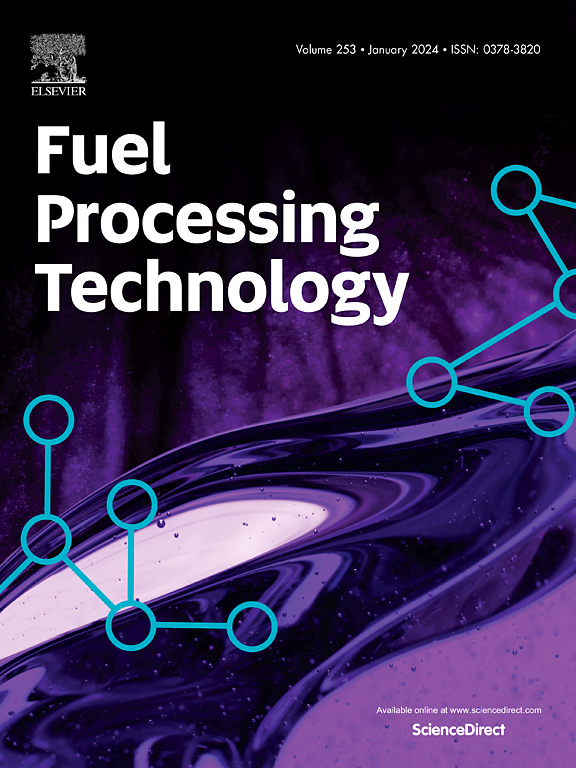Upcycling Waste to Wealth: CuO-SiO₂/reduced graphene nanocomposite from pomegranate peels for one-pot low-temperature conversion of waste oils into valuable fatty acid monomers
IF 7.7
2区 工程技术
Q1 CHEMISTRY, APPLIED
引用次数: 0
Abstract
The utilisation of heterogeneous catalysts in producing fatty acid monomers can minimise the separation cost and hence reduce the price of the fatty acid monomers. This study reports for the first time a novel, environmentally benign, highly active copper oxide-silica oxide/reduced graphene oxide (CuO-SiO2/RGO), heterogeneous nano-catalyst derived from waste pomegranate peels, for the one-pot, low-temperature synthesis of fatty acid monomers from high-acid-value waste vegetable oil (WVO). The synthesised nano-catalyst was extensively characterised using XRD, FT-IR, TEM, SEM, EDX and TGA-DTA. Further, it was utilised to synthesise fatty acid-rich oleic phenoxypropyl acrylate (OPA) monomer from high acid value WVO via a single-step reaction. The process parameters for the synthesis of OPA monomer using CuO-SiO2/RGO catalyst have been optimised using response surface methodology (RSM) and found to be 8.5:1 reactant molar ratio, 3.5 % (w/w) catalyst loading, 54 °C temperature, and 9.5 h reaction time, where the highest OPA monomer yield was 95.73 % under optimum conditions. The CuO-SiO2/RGO exhibited stable catalytic performance after regeneration with an OPA yield of 93.1 ± 0.37 % after five consecutive runs. The plausible reaction mechanism unveiled that the direct synthesis of OPA monomer from high acid value WVO occurred through both transesterification and esterification reactions simultaneously on the surface of CuO and SiO2 catalyst supported on RGO sheets. The adaptation of waste pomegranate peels into a high-value CuO-SiO2/RGO nano-catalyst offers a new direction for clean, one-pot and low-temperature production of sustainable fatty acid monomers from high-acid-value WVO.
将废物转化为财富:将石榴皮中的cuo - sio2 /还原石墨烯纳米复合材料用于一锅低温将废油转化为有价值的脂肪酸单体
利用多相催化剂生产脂肪酸单体可以最大限度地降低分离成本,从而降低脂肪酸单体的价格。本研究首次报道了一种新型的、环保的、高活性的氧化铜-氧化二氧化硅/还原氧化石墨烯(CuO-SiO2/RGO)纳米催化剂,该催化剂来源于废石榴皮,用于一锅低温合成高酸值废植物油(WVO)脂肪酸单体。采用XRD、FT-IR、TEM、SEM、EDX和TGA-DTA对合成的纳米催化剂进行了表征。进一步以高酸值WVO为原料,通过一步反应合成了富脂肪酸油基苯氧丙酯(OPA)单体。采用响应面法(RSM)对CuO-SiO2/RGO催化剂合成OPA单体的工艺参数进行了优化,优化后的工艺参数为8.5:1反应物摩尔比、3.5% (w/w)催化剂负载、54℃温度、9.5 h反应时间,在此条件下,OPA单体收率最高可达95.73%。再生后的CuO-SiO2/RGO具有稳定的催化性能,连续运行5次后,OPA产率为93.1±0.37%。反应机理表明,高酸值WVO在还原氧化石墨烯片上负载CuO和SiO2催化剂表面同时发生酯交换和酯化反应,直接合成OPA单体。将石榴废皮改造成高值CuO-SiO2/RGO纳米催化剂,为高酸值WVO清洁、一锅、低温生产可持续脂肪酸单体提供了新的方向。
本文章由计算机程序翻译,如有差异,请以英文原文为准。
求助全文
约1分钟内获得全文
求助全文
来源期刊

Fuel Processing Technology
工程技术-工程:化工
CiteScore
13.20
自引率
9.30%
发文量
398
审稿时长
26 days
期刊介绍:
Fuel Processing Technology (FPT) deals with the scientific and technological aspects of converting fossil and renewable resources to clean fuels, value-added chemicals, fuel-related advanced carbon materials and by-products. In addition to the traditional non-nuclear fossil fuels, biomass and wastes, papers on the integration of renewables such as solar and wind energy and energy storage into the fuel processing processes, as well as papers on the production and conversion of non-carbon-containing fuels such as hydrogen and ammonia, are also welcome. While chemical conversion is emphasized, papers on advanced physical conversion processes are also considered for publication in FPT. Papers on the fundamental aspects of fuel structure and properties will also be considered.
 求助内容:
求助内容: 应助结果提醒方式:
应助结果提醒方式:


